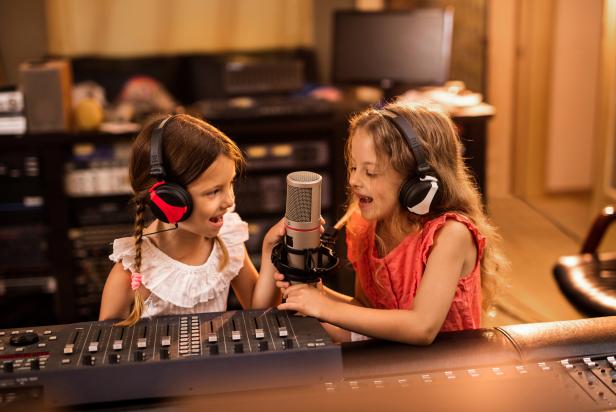Parenting Win of the Week: Future Podcaster
Encourage your kiddo's passion for all kinds of topics.


skynesher
As my kids get older, they are starting to explore different activities and it’s so fun to see what sticks. My youngest has always been into performing, starring in plays when he was younger, and always full of emotions and words. Lately, much of his passion has been towards play-by-plays of NFL games, much of which he discusses at the dinner table. His teacher noticed his passion for all things football and recommended that he start a podcast! She went as far as helping him write a script to follow.
Anyways, he’s super into it and even with a few friends who have successful podcasts, I don’t know the first thing about teaching a kid how to podcast. So, I consulted one of the best podcast producers, Peter McNerney, the casting director, co-host, and a core performer of the Story Pirates. If you aren’t familiar with the Story Pirates, they host an award-winning kid and family podcast that has become a sort of phenomenon with a book club, activities, live events, and more. It’s a really fun listen with lots of recognizable guest stars like Seth Meyers and Sara Bareilles.

Courtesy of Peter McNerney
But Peter’s journey with the Story Pirates started live on stage in schools where he loved performing. Eventually, he became the New York artistic director, then they got a SiriusXM radio show and eventually, during the pandemic, everything digital (including the podcast) got huge and most of his efforts were geared towards writing, producing, and editing the podcast.
Needless to say, he’s learned quite a few things along the way.
He gave advice on the most important things to keep in mind when starting a podcast.
Define What Kind of Podcast You Want
Not all podcasts are created equal. There are a million different ways to go about it. Here are a few ways to go:
- Talk show format: This is casual and they can unpack something they love with reactions to that.
- Presentation shows: "This episode we are going to learn about dinosaurs." You present the info you learn about it.
- Storytelling podcasts: This can feature written scripts, usually fiction, with elements of drama.
- Interview shows: Find experts and talk to them.
Follow the Fun!
Related to that, have your kid "follow the fun" as Peter says, choosing a topic that really gets them excited.
"What are you excited about? Don’t think about what people want to hear…what is going to make you excited to play with every time," Peter says.
And that is what will keep you motivated to keep talking about it week after week.
Say YES to Your Own Ideas
This is where Peter shares advice that is so good for everyone, adults included. In fact, he argues, kids are probably better at this than adults.
It’s very easy to think about what’s not good about your idea. But if you shut ideas down before you’ve let them breathe, you’ll never find the hidden discoveries in them.
Early on, try saying yes to all of your own ideas. Failure is great. If you decide this wasn’t a good idea at the end of the path, you can take lessons you’ve learned.
The only thing that never works is not trying.
Go for it, make a mess, learn from your mistakes.
Now Let’s Get Started!
There are three main steps to podcasting: scripting, recording and editing.
- Write an Outline
- For script writing, don’t worry — it doesn’t mean writing pages and pages unless you are recording a scripted audio play of sorts. Peter recommends having a solid intro and outro written and if you have more of a talk show format, you can just bullet-point the things that are in between. It is helpful for anyone to have notes to make sure they stay on task.
- Record
- Audio quality is of course important, but in the beginning it’s important to just get recording. You can buy a fairly inexpensive USB microphone and record in a closet with lots of sweaters to buffer the noise. Once you are more serious, you can do other things — but for now, just get recording!
- Editing
- Editing is super important, but you’ll want to wait a day before you tackle this part so you can listen with fresh ears. There are a bunch of different programs out there to edit with varying degrees of difficulty. Play around with what works and you’ll get into a rhythm.
- Post and Share
- If your kid is serious enough, you’ll want to look into a hosting site. Anchor.fm is a free site to host and also edit your podcast. You’ll want to make sure they define a schedule they can stick to, like weekly for one season (i.e. 10 episodes) before they take a break for season 2.
You can listen to the Story Pirates here or on your podcast player of choice. They also have a few live benefit performances coming in New York and Los Angeles. Visit their website for more details.
YOU MIGHT ALSO LIKE:















